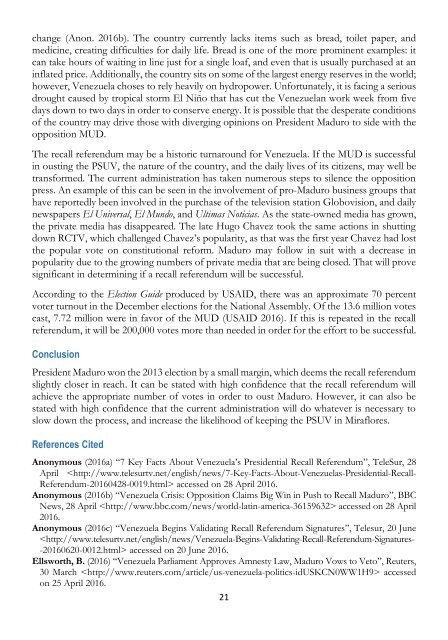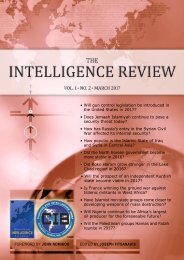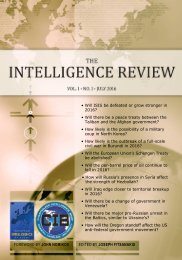The Intelligence Review | vol. 1 | iss. 1 |
This volume is the product of a collaboration between the European Intelligence Academy (EIA) and the Chanticleer Intelligence Brief (CIB), a student-run initiative supported by the Department of Politics at Coastal Carolina University in Conway, South Carolina, United States. Eleven CIB analysts tackle some of the most pressing and timely questions confronting intelligence observers today. Topics range from the price of oil to political stability in Venezuela, from the territorial cohesion of Iraq to the future of the Islamic State, and many other pressing subjects that feature daily in news headlines. CIB analysts propose carefully crafted and informed forecasts that outline future developments in some of the world's most unpredictable hot spots.
This volume is the product of a collaboration between the European Intelligence Academy (EIA) and the Chanticleer Intelligence Brief (CIB), a student-run initiative supported by the Department of Politics at Coastal Carolina University in Conway, South Carolina, United States. Eleven CIB analysts tackle some of the most pressing and timely questions confronting intelligence observers today. Topics range from the price of oil to political stability in Venezuela, from the territorial cohesion of Iraq to the future of the Islamic State, and many other pressing subjects that feature daily in news headlines. CIB analysts propose carefully crafted and informed forecasts that outline future developments in some of the world's most unpredictable hot spots.
- No tags were found...
Create successful ePaper yourself
Turn your PDF publications into a flip-book with our unique Google optimized e-Paper software.
change (Anon. 2016b). <strong>The</strong> country currently lacks items such as bread, toilet paper, and<br />
medicine, creating difficulties for daily life. Bread is one of the more prominent examples: it<br />
can take hours of waiting in line just for a single loaf, and even that is usually purchased at an<br />
inflated price. Additionally, the country sits on some of the largest energy reserves in the world;<br />
however, Venezuela choses to rely heavily on hydropower. Unfortunately, it is facing a serious<br />
drought caused by tropical storm El Niño that has cut the Venezuelan work week from five<br />
days down to two days in order to conserve energy. It is possible that the desperate conditions<br />
of the country may drive those with diverging opinions on President Maduro to side with the<br />
opposition MUD.<br />
<strong>The</strong> recall referendum may be a historic turnaround for Venezuela. If the MUD is successful<br />
in ousting the PSUV, the nature of the country, and the daily lives of its citizens, may well be<br />
transformed. <strong>The</strong> current administration has taken numerous steps to silence the opposition<br />
press. An example of this can be seen in the in<strong>vol</strong>vement of pro-Maduro business groups that<br />
have reportedly been in<strong>vol</strong>ved in the purchase of the television station Globovision, and daily<br />
newspapers El Universal, El Mundo, and Ultimas Noticias. As the state-owned media has grown,<br />
the private media has disappeared. <strong>The</strong> late Hugo Chavez took the same actions in shutting<br />
down RCTV, which challenged Chavez’s popularity, as that was the first year Chavez had lost<br />
the popular vote on constitutional reform. Maduro may follow in suit with a decrease in<br />
popularity due to the growing numbers of private media that are being closed. That will prove<br />
significant in determining if a recall referendum will be successful.<br />
According to the Election Guide produced by USAID, there was an approximate 70 percent<br />
voter turnout in the December elections for the National Assembly. Of the 13.6 million votes<br />
cast, 7.72 million were in favor of the MUD (USAID 2016). If this is repeated in the recall<br />
referendum, it will be 200,000 votes more than needed in order for the effort to be successful.<br />
Conclusion<br />
President Maduro won the 2013 election by a small margin, which deems the recall referendum<br />
slightly closer in reach. It can be stated with high confidence that the recall referendum will<br />
achieve the appropriate number of votes in order to oust Maduro. However, it can also be<br />
stated with high confidence that the current administration will do whatever is necessary to<br />
slow down the process, and increase the likelihood of keeping the PSUV in Miraflores.<br />
References Cited<br />
Anonymous (2016a) “7 Key Facts About Venezuela’s Presidential Recall Referendum”, TeleSur, 28<br />
April accessed on 28 April 2016.<br />
Anonymous (2016b) “Venezuela Crisis: Opposition Claims Big Win in Push to Recall Maduro”, BBC<br />
News, 28 April accessed on 28 April<br />
2016.<br />
Anonymous (2016c) “Venezuela Begins Validating Recall Referendum Signatures”, Telesur, 20 June<br />
accessed on 20 June 2016.<br />
Ellsworth, B. (2016) “Venezuela Parliament Approves Amnesty Law, Maduro Vows to Veto”, Reuters,<br />
30 March accessed<br />
on 25 April 2016.<br />
21





